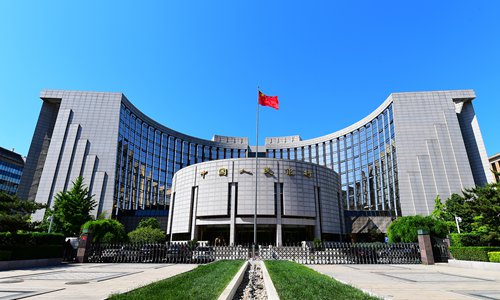PBC may launch digital currency before Libra
China’s move challenges hegemony of US dollar

A view of People's Bank of China in Beijing. File photo: VCG
Beijing could soon roll out its central bank-backed digital currency after five years of research, industry insiders said. The launch could be earlier than the cryptocurrency Libra developed by US company Facebook, which is scheduled to be released in 2020.
Some observers said that the move shows that China's central bank aims to construct a different payment system that challenges US dollar hegemony. It will also help the nation gain a firm start in the increasingly competitive digital economy race.
"There are positive signs that the digital currency electronic payment (DC/EP) will be released soon. Officials from the central bank disclosed a lot about the plan in recent months, in formal or informal ways," said Li Lihui, head of the Blockchain Research Working Group at the National Internet Finance Association of China, at the Caijing Forum 2020 in Beijing on Wednesday.
The People's Bank of China (PBC), the central bank, said on Wednesday that it is still studying and testing its own digital currency. It also noted that the country had not issued any digital currencies nor authorized any asset trading platforms to trade such currencies.
China's digital currency will not entirely rely on blockchain and will probably be "technology neutral," according to Li, as blockchain technology is not able to cope with explosive demand at the current stage. Dispelling market rumors, Li stressed that DC/EP will still be centralized so that monetary coordinative policy could function and being implemented efficiently within the system.
"The digital currency will inherit the current mechanism of the currency market: the central bank issues a digital currency to commercial banks and then the commercial banks distribute it to the public." It is designed with the function of M0", or cash in circulation, Li explained.
But he noted that Chinese regulators will "allow anonymous payment" via DC/EP within the scope designated by the PBC.
As digital currencies will be at the core of the future global digital economy, Li called on the PBC to push forward the plan and technological roadmap for DC/EP.
"Chinese officials should accelerate debate on questions regarding which part of the payment system should remain anonymous and whether DC/EP should be split from the current financial system," he suggested.
Facebook announced in June that it plans to launch Libra, which will be pegged to a basket of currencies such as the US dollar, the pound, the euro and the yen. The yuan is not included in the basket.
Many view Libra as a threat to sovereign currencies, including the yuan, and a means to reinforce the current financial system dominated by the US dollar.
Compared with Libra, the digital currency launched by the PBC is likely to earn more trust, according to industry insiders. "Without strong support from real assets and credit, the price of a digital currency [issued by Facebook] could be highly volatile. It will be too speculative for investors [to purchase]," Li noted.
Meng Yan, vice president of the Beijing-based Digital Asset Research Institute, told the Global Times on Wednesday that the establishment of the DC/EP-led currency system will help chop away the dollar hegemony amid the lingering trade war, which appears to be spreading to the financial sector.
"Washington cut off some Iranian banks from SWIFT last year as part of its sanctions. It acts as a warning and it is vitally important for China to find a substitute to the current financial system to guard against such risk," he added. The US has great influence on SWIFT, an interbank organization, which provides transaction clearance services for its member banks.
An industry insider, who spoke on condition of anonymity, suggested that China could use DC/EP payment and clearing services as an entry point to nurture a global financial system that extends to every citizen's life from asset transactions and financing to investment and insurance.
Last week, the Hong Kong Securities and Futures Commission launched a position paper on virtual currency exchange platform regulation. This move is seen as boosting the development of digital currencies in China, and it means that the special administrative region is one step closer to having a legitimate virtual currency trading exchange.


